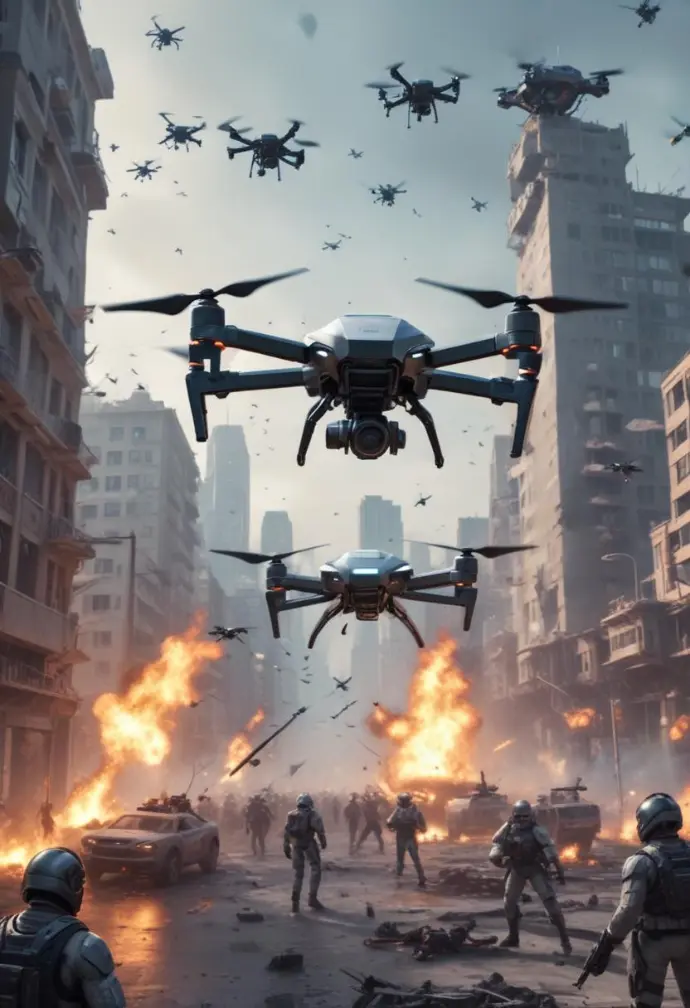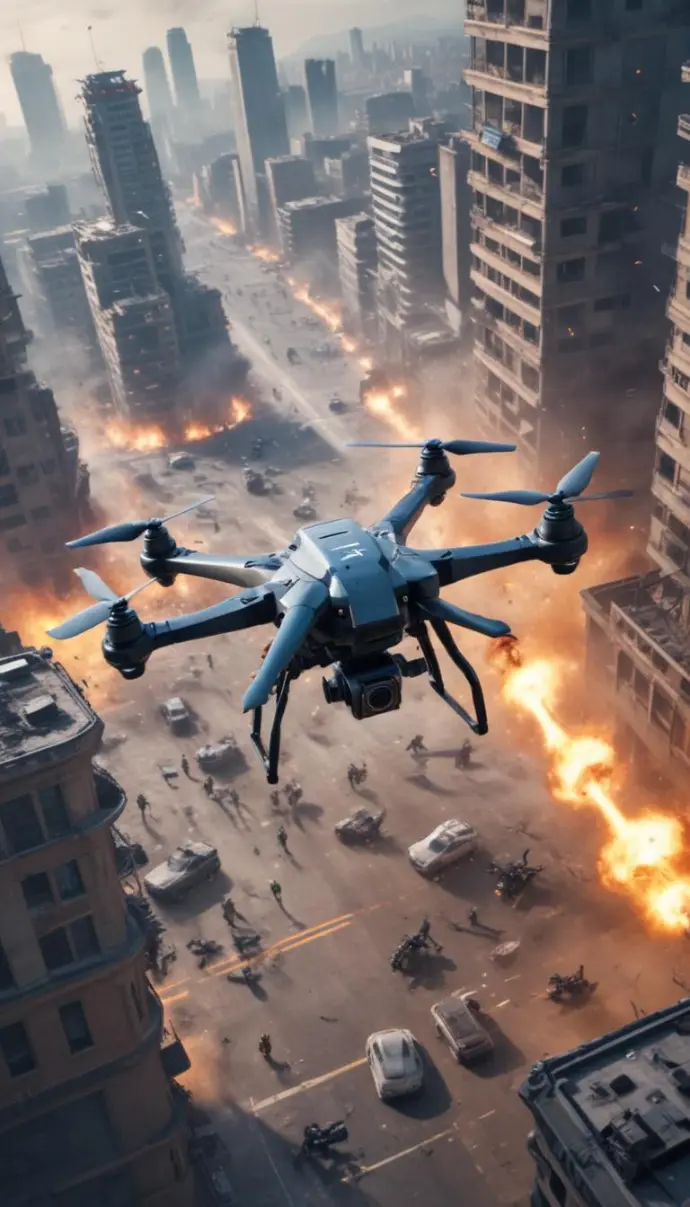Dive into a captivating analysis of the wonders, dilemmas, and challenges posed by emerging technologies. In our feature article, "Ethics of Autonomous Weapons," we'll delve into how artificial intelligence is shaping the ethical and strategic landscape of the battlefield. Ready to understand how this technological revolution is redefining the interplay between warfare and morality? Prepare, explorers of tomorrow, the adventure is just beginning!
Introduction to Autonomous Weapons
Autonomous weapons, also known as autonomous weapons systems, are weapons systems that can operate without direct human intervention. These systems are capable of independently identifying, selecting, and engaging targets, using artificial intelligence and algorithms to make decisions in real time. Autonomous weapons can include drones, unmanned ground vehicles, air defense systems, and other types of weaponry.
Given their ability to make decisions and act autonomously, autonomous weapons raise important ethical and legal questions in the context of modern warfare. The possibility of deploying weapons systems that can independently select and engage targets poses significant challenges in terms of accountability, control, and unintended consequences.
The development and use of autonomous weapons has generated intense international debate, with calls for regulations and standards for their ethical and responsible use on the battlefield.
The concept of autonomous weapons is not new, as there have been several significant advances in this field throughout history. During World War II, for example, self-propelled torpedoes were developed that could follow preprogrammed paths to impact their targets. These torpedoes represented an early milestone in the development of autonomous weapons systems.
In subsequent decades, technological advancements have led to the development of unmanned aerial vehicles (drones) capable of autonomously performing reconnaissance and attack missions. These advances have laid the groundwork for the creation of increasingly sophisticated autonomous weapons systems with more complex decision-making capabilities.
The continued development and advancement of artificial intelligence, machine learning, and high-performance computing have further driven the development of autonomous weapons, raising important questions about their impact and consequences in the context of modern warfare.
The emergence of autonomous weapons has posed significant challenges and opportunities in modern warfare. On the one hand, it is argued that these systems could reduce the risk to human troops when performing dangerous or high-risk tasks. Furthermore, it is argued that autonomous weapons could make faster and more accurate decisions in combat situations, which could potentially save lives.
On the other hand, the deployment of autonomous weapons raises ethical and legal concerns, including the possibility of target identification errors, collateral damage, and the lack of human oversight in lethal decision-making. The lack of direct human accountability and control over these weapons has generated intense debate about the need to establish clear limits and regulations for their development and use.
The impact of autonomous weapons on modern warfare is a highly relevant and complex issue, requiring a detailed analysis of their ethical, legal, and strategic implications in the context of evolving military technology.
Autonomous weapons, also known as lethal autonomous weapons systems (LAWS), pose a number of ethical and moral challenges in the context of warfare and armed conflict. These systems, which use artificial intelligence to make decisions about target selection and engagement without direct human intervention, have raised global concerns. The main ethical issue lies in the ability of these weapons to correctly discriminate between military and civilian targets, as well as the potential for indiscriminate harm.
Furthermore, the lack of individual responsibility in the use of autonomous weapons raises questions about the attribution of responsibility and accountability in the event of errors or violations of international humanitarian law. As technology continues to advance, it is crucial to consider the ethical implications of delegating lethal decisions to automated systems, especially in a context as sensitive as the battlefield.
The discussion on the ethics of autonomous weapons covers a wide range of aspects, from the protection of human rights to the impact on international security. As we explore this topic, it is critical to consider not only the immediate implications of these technologies, but also their long-term influence on the very nature of warfare and the morality of military actions.
Development of Artificial Intelligence in Autonomous Weapons
Autonomous weapons are weapons systems capable of identifying, selecting, and engaging targets without direct human intervention. The integration of artificial intelligence (AI) into these types of weapons has generated intense debate in the international community, raising ethical and legal questions about the use of the technology in warfare.
Artificial intelligence has enabled the development of autonomous weapons capable of making real-time decisions, which poses significant challenges in terms of control and oversight. These systems can operate independently, raising questions about liability in the event of errors or collateral damage.
The intersection of ethics, technology, and the military context has raised concerns about the possibility of autonomous weapons making decisions that could be considered immoral or contrary to international humanitarian law. The integration of AI on the battlefield raises the need to establish protocols and regulatory frameworks that ensure the ethical use of these technologies.
In recent years, there has been rapid progress in the integration of artificial intelligence on the battlefield. Countries such as the United States, Russia, and China have invested significantly in the development of autonomous systems, including unmanned vehicles, drones, and automated defense systems.
These advances have raised concerns in the international community, as they raise questions about the proliferation of autonomous weapons and their potential impact on armed conflicts. The lack of consensus around the regulation of these technologies has fueled debate about the need to establish international standards governing the development and use of autonomous weapons.
The integration of AI on the battlefield has also generated discussions about the need to ensure transparency and accountability in the development and use of these technologies. The opacity surrounding the algorithms and decision-making processes of autonomous weapons poses challenges in terms of oversight and control, leading to calls for transparency and accountability standards in the development of these systems.
The integration of artificial intelligence in warfare poses significant ethical and legal challenges. The ability of autonomous weapons to make independent decisions raises questions about the accountability and oversight of these technologies.
Furthermore, the possibility that autonomous weapons may make decisions that could be considered immoral or contrary to international humanitarian law has raised concerns in the international community. The development and use of these technologies raises the need to establish regulatory frameworks that ensure the ethical and legal use of autonomous weapons in warfare.
The lack of consensus regarding the regulation of autonomous weapons has fueled debate about the need to establish international regulations governing the development and use of these technologies. The international community is at a crucial moment to address these ethical and legal challenges in order to ensure the responsible use of artificial intelligence in warfare.
The autonomy of AI-powered weapons poses several ethical and practical risks that must be carefully considered. One of the main risks is the lack of human oversight in critical battlefield decision-making. The ability of autonomous weapons to identify and engage targets without human intervention poses significant challenges in terms of responsibility and accountability. Furthermore, there are concerns that AI may make mistakes or be susceptible to cyberattacks, which could result in catastrophic consequences.
Another major risk is the possibility that autonomous weapons could be used indiscriminately or to carry out illegal or immoral actions. The lack of ethical and moral discernment in AI decision-making could result in serious violations of international humanitarian law and fundamental ethical principles. Furthermore, the proliferation of autonomous weapons could lead to an unprecedented arms race, increasing the likelihood of conflict and exacerbating international tensions.
Finally, the autonomy of AI-powered weapons raises questions about the possibility of deploying lethal systems that operate autonomously without effective human oversight. This could lead to situations where decisions made by AI are not understandable to humans, making it difficult to assign responsibility and take corrective action in the event of errors or malfunctions. Consequently, it is crucial to assess and mitigate these risks to ensure that the development and deployment of autonomous weapons are aligned with fundamental ethical and legal considerations.
Ethics of Autonomous Weapons: Perspectives and Debates
Those who defend the use of autonomous weapons argue that these technologies can reduce the risk to soldiers by not requiring their physical presence on the battlefield. Furthermore, they argue that the precision and speed of decisions made by autonomous systems can minimize collateral damage and, consequently, reduce the suffering of innocent civilians during armed conflicts.
Furthermore, it is emphasized that the implementation of autonomous weapons could be an effective response to asymmetric threats, such as guerrilla or terrorist attacks, allowing for an immediate and adaptive response capacity to changing situations.
In the military sphere, it is also argued that AI applied to weapons can facilitate tactical and strategic decision-making, improving the efficiency and effectiveness of military operations.
On the other hand, those who oppose the use of autonomous weapons warn of the risk of losing human control over lethal decisions. It is argued that the lack of direct oversight in critical decision-making could result in indiscriminate actions or violations of international humanitarian law.
Furthermore, there is concern that autonomous weapons could be misused by authoritarian regimes or terrorist groups, exacerbating conflicts and jeopardizing global stability.
Another point of controversy centers on the ethical and legal responsibility for actions carried out by autonomous systems, as well as the difficulty of establishing effective accountability mechanisms in the event of incidents or violations.
In the debate over autonomous weapons, fundamental ethical questions arise that require deep reflection. The integration of artificial intelligence in war contexts raises ethical challenges related to the morality of decisions made by machines, the protection of human dignity, and the preservation of international peace and security.
It is crucial to analyze the potential impact of autonomous weapons in terms of human rights, considering the principle of proportionality and respect for life. Likewise, regulatory frameworks and oversight mechanisms must be established to ensure compliance with ethical and legal standards in the development and use of these technologies in the context of warfare.
The discussion surrounding the ethics of autonomous weapons requires the active participation of experts in ethics, international law, technology, and security, in order to promote an informed dialogue aimed at protecting human rights and global stability.
International regulations surrounding autonomous weapons represent an ethical and legal challenge in the context of modern warfare. As technology continues to advance, there is a growing need to establish regulations governing the development, deployment, and use of these weapons. Organizations such as the United Nations have actively debated the need to regulate autonomous weapons, with the aim of preventing potential abuses and human rights violations on the battlefield.
The future of autonomous weapons will depend largely on the international community's ability to reach agreements that establish clear limits and responsibilities regarding their use. The challenge lies in balancing the need to protect civilians and uninvolved combatants with the legitimate potential of these weapons to reduce risks to fellow military personnel in combat situations. Furthermore, it is crucial to consider the possibility that autonomous weapons may be used indiscriminately or with malicious intent, underscoring the importance of establishing effective regulations and oversight mechanisms.
In this context, international dialogue and collaboration are essential to address the ethical and legal dilemmas posed by the development of autonomous weapons. Consensus-building, transparency in research and development, and accountability are key aspects that must be considered in the formulation of international regulations that promote the ethical and responsible use of artificial intelligence on the battlefield.
Ethics of Autonomous Weapons: Final Thoughts
The development of autonomous weapons poses a significant potential impact on the future of warfare. These technologies have the potential to change the dynamics of armed conflict, enabling more precise and lethal military operations. However, they also pose unprecedented ethical and legal challenges, as lethal decision-making rests with artificial intelligence systems rather than humans.
The use of autonomous weapons raises questions about conflict escalation, liability for collateral damage, and the possibility of developing systems that violate ethics and international humanitarian law. It is crucial to consider these potential impacts when discussing the development and use of autonomous weapons on the battlefield.
The debate about the impact of autonomous weapons on the future of warfare is critical to understanding how these technologies can redefine the nature of armed conflict and their ethical implications.
Ethical considerations for the development and use of autonomous weapons are critical to ensuring that these technologies are used responsibly and consistent with the principles of the ethics of war. It is crucial to address issues such as lethal decision-making, human oversight in the use of autonomous weapons, proportionality in the use of force, and the protection of civilians in armed conflict.
Furthermore, transparency in the development and use of autonomous weapons, accountability of the actors involved, and assessment of associated risks are key ethical aspects that must be considered. The international community, governments, and civil society organizations have a responsibility to address these ethical considerations in a comprehensive and collaborative manner.
The development and use of autonomous weapons pose complex ethical challenges that require a multidisciplinary approach and deep reflection on the moral and legal implications of these technologies in the context of warfare.
The active participation of public opinion in the debate on autonomous weapons is essential to ensure that ethical, moral, and legal considerations are taken into account in the development and use of these technologies. Raising public awareness about the risks and benefits of autonomous weapons, as well as their potential impact on human rights, is crucial to inform dialogue and informed decision-making.
Civil society, non-governmental organizations, and citizens have a responsibility to advocate for the ethical and legal use of autonomous weapons, as well as to demand transparency and accountability from state and non-state actors involved in the development and deployment of these technologies.
The role of public opinion in the debate on autonomous weapons is critical to ensure that ethical and moral concerns are considered and that an ethical and responsible approach to the use of technology in the context of warfare is promoted.
The role of artificial intelligence (AI) on the battlefield poses several ethical and moral challenges that must be addressed seriously. While autonomous weapons can offer advantages in terms of accuracy and speed of response, they also pose significant risks in terms of ethical decision-making. It is essential to consider the impact of AI on the escalation of conflicts and the safety of civilians.
Furthermore, it is crucial to establish clear norms and regulations surrounding the development and use of autonomous weapons. The international community must work together to define ethical standards to guide the deployment of AI on the battlefield, thereby minimizing the risk of human rights abuses and violations. Transparency and accountability are fundamental elements to ensure the ethical use of AI in military contexts.
Ultimately, the integration of artificial intelligence on the battlefield requires a careful and thoughtful approach, with a clear emphasis on the protection of human rights and the minimization of suffering in conflict situations. The ethics of autonomous weapons must be a central issue in debates about the future of warfare and international security.




